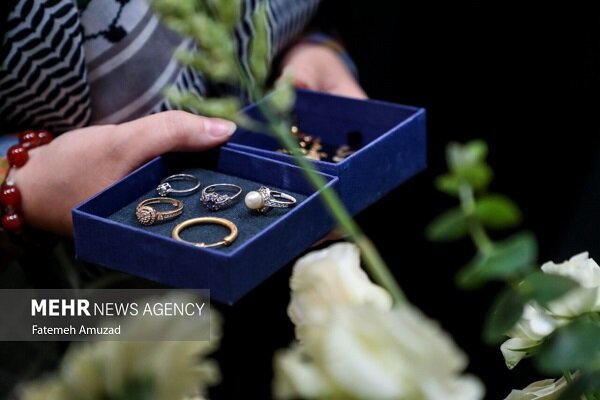Today is that critical day!

This gold donation symbolizes the Muslim Iranian women who transcend the material world's feminine adornments to serve their homeland, Islam, and humanity.
Mehr News Agency, Magazine Group - Mobina Afrakhteh: The taxi driver was listening to the radio when it got to this news: *"Daughters and mothers who do not hesitate to donate even their most precious possessions, like their wedding rings, to help the oppressed people of Palestine and Lebanon, today joined the ‘Iran in Solidarity’ campaign. The line of gold, coins, money, and even apartment and car donations for the 'Iran in Solidarity' campaign to aid and support the people of Palestine and Lebanon is long."* The driver was taken aback and said, "We have so many poor people in our own country, in places like Sistan and Baluchestan. Why doesn't anyone think of them? I say, charity begins at home." Exhausted from work and irritation weighing on me, I wanted to say, "Right on, you're absolutely correct." But I kept quiet.
Suddenly, images of Gaza's children, that arm attached to my head, and the body burning in the bombings flashed before my eyes. I recalled that girl who was counting down the days to wear her wedding dress but, after seeing a video of a Palestinian child, gave up her wedding celebration and donated all the ceremony costs to the resistance. Or that woman who, when she saw the bleak life of the people of Palestine, gave away her late husband's only memento to fund makeshift shelters in Gaza.
The more I thought about this gesture's nature, the more admirable and thought-provoking it became. This gold donation represents Iranian Muslim women who, to help their homeland, Islam, and the oppressed, willingly give up what the material world considers a woman's adornment to serve their homeland, Islam, and humanity, just as they did during the eight-year Iran-Iraq war. They say, *"It reminded us of the early days of service and the imposed war when people eagerly came forward to donate their gold for the frontlines."* The roots of this solidarity among Iranians have a shared origin. Both during the Sacred Defense and now in supporting the resistance front, women stood on the front line. Women who, not only here but across Iran, became ambassadors and multipliers of the ‘Iran in Solidarity’ campaign.
Her name is Sara. She’s about 15 years old and still a teenager. Wearing her green school uniform and headscarf, she comes forward wholeheartedly to present a gold ring to the resistance front. The ring is precious to her, earned through a month of fasting and patience. Her father had gifted it to her, and she endured the 30 days of Ramadan fasting in anticipation of her father's gift, but now, only one thing matters to her—the leader's command.
They say gold is for a rainy day. Whatever you have, it will never be a waste; at some point in life’s hardships, it can open doors. Now, the situation in Gaza and Lebanon is one of those rainy days, and Iranian girls, mothers, and women, with their small and large gold investments, have taken action to bring solace to Palestinian and Lebanese women, girls, and mothers. Like Leyla, who, with a firm stance and her sweet Turkish accent, strikes her chest and says, *“Ask me for my life.”* She’s a housewife with no independent income, yet the golden set she’s prepared to donate to the resistance includes a bracelet, ring, and necklace worth around two billion tomans. Its value is evident from its appearance alone. Only a person with a grand spirit and a heart as vast as the sea can offer such a valuable gift without worrying about the potential future challenges for herself and her children.
In an age when the lines for cosmetic surgeries, from extreme to fantasy, are growing worldwide, our women are quickly giving up an element of beauty. This is a hopeful sign, showing that our country's women think beyond the consumerist capitalist cycle and that life and love flow; love for humanity and the oppressed, which reducing to mere propaganda or a homeland-versus-foreign binary would be a denial of the facts.
Economy or war?
Mirza Mohammad Taqi Khan Farahani, known as Amir Kabir, was the first prime minister during the reign of Naser al-Din Shah Qajar in Iran. During that time, a factory was established in Isfahan for cannon production. A while later, due to England’s blockade of ports and sanctions, a problem arose regarding metal melting for cannon production. In response, Amir Kabir asked people to sell any extra copper pots they had to the factory. A sudden uproar ensued in the city—a fire that was kindled by the English.
The English propaganda convinced people that Amir Kabir wouldn’t even spare their pots, wanting the people to starve so that he could make weapons and start a war. This narrative, propagated by the English, had a deep impact on public opinion, and in the end, they achieved their goal. The factory head, an Austrian engineer, eventually left Iran due to the lack of raw materials and funds to pay workers, and Amir Kabir's project failed.
Some time later, the English attacked Bushehr and threatened Iran, saying, “If you don’t surrender Afghanistan, Qandahar, and Herat, we will advance from the south to Tehran.” Iran, lacking a cannon to defend itself, accepted the terms and was defeated. The sole reason for this loss was the divide that the English cleverly created within society, steering people towards their own dark purposes. The English had introduced an economic-versus-war binary among the people, saying, "Choose the economy," but in reality, what occurred was war, and the economy ultimately fell into decline and ruin. It’s the same tactic that foreign and hostile media employ today, aiming to set the people against resistance and independence.





